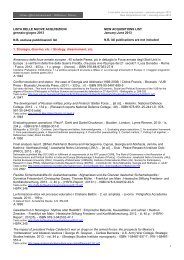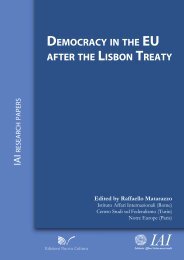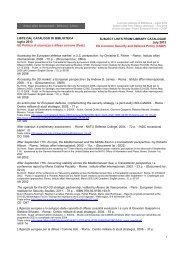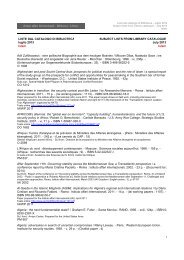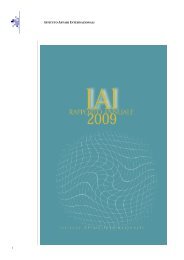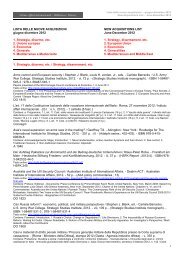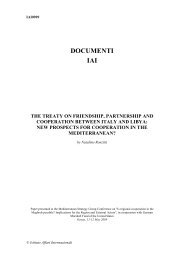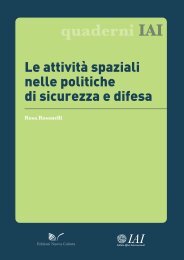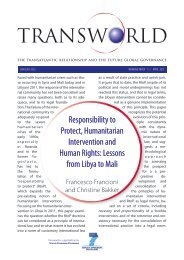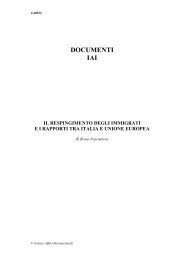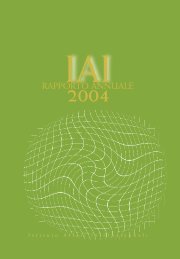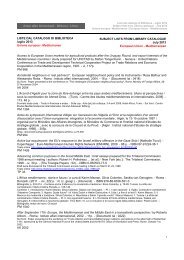Azerbaijan's Foreign Policy and the Nagorno-Karabakh Conflict
Azerbaijan's Foreign Policy and the Nagorno-Karabakh Conflict
Azerbaijan's Foreign Policy and the Nagorno-Karabakh Conflict
Create successful ePaper yourself
Turn your PDF publications into a flip-book with our unique Google optimized e-Paper software.
Istituto Affari Internazionali<br />
IAI WORKING PAPERS 13 | 12 – April 2013<br />
ISSN 2280-4331<br />
Azerbaijan’s <strong>Foreign</strong> <strong>Policy</strong> <strong>and</strong> <strong>the</strong><br />
<strong>Nagorno</strong>-<strong>Karabakh</strong> <strong>Conflict</strong><br />
Elizabeth Fuller<br />
Abstract<br />
The over-riding objective of Azerbaijan’s foreign policy has<br />
been to secure a solution to <strong>the</strong> longst<strong>and</strong>ing conflict over<br />
<strong>Nagorno</strong>-<strong>Karabakh</strong> on Azerbaijan’s terms. Consequently,<br />
Azerbaijan’s foreign policy is focused primarily on<br />
streng<strong>the</strong>ning ties with those states <strong>and</strong> organizations that are<br />
perceived as willing <strong>and</strong> able to help it achieve that objective.<br />
Azerbaijan’s motivation for prioritizing a solution to <strong>the</strong><br />
<strong>Karabakh</strong> conflict is two-fold. First, to remove <strong>the</strong> long-term<br />
security threat posed by <strong>the</strong> existence on Azerbaijani territory<br />
of an Armenian-populated enclave with a highly trained<br />
military. And second, to enhance Azerbaijan’s international<br />
prestige <strong>and</strong> fur<strong>the</strong>r its aspiration to parlay its Caspian<br />
hydrocarbon wealth into <strong>the</strong> status of <strong>the</strong> dominant power in<br />
<strong>the</strong> South Caucasus. The fundamental constraints Azerbaijan<br />
faces in pursuing <strong>the</strong>se twin objectives result from its<br />
geographical location, between <strong>the</strong> Caspian <strong>and</strong> <strong>the</strong> Black<br />
Sea, bordering on Russia to <strong>the</strong> north <strong>and</strong> Iran to <strong>the</strong> south.<br />
Azerbaijan’s geopolitical environment has impelled Azerbaijan<br />
to pursue a maximally balanced <strong>and</strong> pragmatic foreign policy<br />
necessitating a “compartmentalization” of bilateral relations<br />
with its neighbours <strong>and</strong> global partners.<br />
Keywords: Azerbaijan / <strong>Foreign</strong> policy / <strong>Nagorno</strong>-<strong>Karabakh</strong><br />
conflict / Caucasus / Armenia / Russia / Iran / Turkey / Georgia<br />
/ Natural gas / Oil / Pipelines<br />
© 2013 IAI ISBN 978-88-98042-83-8
IAI Working Papers 1312<br />
Azerbaijan’s <strong>Foreign</strong> <strong>Policy</strong> <strong>and</strong> <strong>the</strong> <strong>Nagorno</strong>-<strong>Karabakh</strong> <strong>Conflict</strong><br />
Azerbaijan’s <strong>Foreign</strong> <strong>Policy</strong> <strong>and</strong> <strong>the</strong> <strong>Nagorno</strong>-<strong>Karabakh</strong> <strong>Conflict</strong><br />
by Elizabeth Fuller ∗<br />
Introduction<br />
Even though Azerbaijan’s leaders do not openly identify it as such, <strong>the</strong> over-riding<br />
objective of Azerbaijan’s foreign policy for <strong>the</strong> past 16 years has been to secure a<br />
solution to <strong>the</strong> longst<strong>and</strong>ing conflict over <strong>Nagorno</strong>-<strong>Karabakh</strong> on Azerbaijan’s terms,<br />
which are <strong>the</strong> preservation of Azerbaijan’s territorial integrity, <strong>the</strong> withdrawal of<br />
Armenian forces from occupied Azerbaijani territory, <strong>and</strong> <strong>the</strong> return of <strong>the</strong> former<br />
Azerbaijani population of <strong>the</strong> region, which would be granted “broad autonomy”.<br />
Consequently, Azerbaijan’s foreign policy engagement - whe<strong>the</strong>r bilateral or multilateral<br />
- is focused primarily (but not exclusively) on streng<strong>the</strong>ning ties with those states <strong>and</strong><br />
organizations that are perceived as willing <strong>and</strong> able to help it achieve that objective,<br />
<strong>and</strong> minimizing <strong>the</strong> threat posed by states seen as out to sabotage any such<br />
settlement.<br />
This paper will evaluate Azerbaijan’s relations with those various categories of foreign<br />
policy actors in terms of how successful (or unsuccessful) <strong>the</strong>y have been in fur<strong>the</strong>ring<br />
that ultimate goal.<br />
1. Background<br />
The <strong>Karabakh</strong> conflict began in February 1988 when tens of thous<strong>and</strong>s of Armenians<br />
staged mass demonstrations in Yerevan in support of a formal request by <strong>the</strong> <strong>Nagorno</strong>-<br />
<strong>Karabakh</strong> Autonomous Oblast to <strong>the</strong> Soviet leadership to designate <strong>the</strong> predominantly<br />
Armenian-populated region part of <strong>the</strong> <strong>the</strong>n Armenian Soviet Socialist Republic (SSR).<br />
The Soviet leadership rejected that dem<strong>and</strong> <strong>and</strong> imposed direct rule in a bid to contain<br />
sporadic low-level fighting during which most of <strong>the</strong> region’s estimated 40,000<br />
Azerbaijani residents fled.<br />
Following <strong>the</strong> collapse of <strong>the</strong> USSR in late 1991 <strong>and</strong> <strong>the</strong> withdrawal of Russian army<br />
units from Azerbaijan, <strong>the</strong> combined Armenian <strong>and</strong> <strong>Nagorno</strong>-<strong>Karabakh</strong> defence forces<br />
succeeded in cementing control over <strong>the</strong> breakaway region, which had formally<br />
declared its independence from <strong>the</strong> USSR in a referendum in December 1991. In 1992-<br />
1993, those forces occupied seven districts of Azerbaijan contiguous to <strong>Nagorno</strong>-<br />
<strong>Karabakh</strong>, <strong>the</strong> Azerbaijani population of which also fled. In May 1994, a ceasefire was<br />
signed in Bishkek that ended full-scale hostilities, but which has not prevented sporadic<br />
Paper prepared for <strong>the</strong> Istituto Affari Internazionali (IAI), April 2013. Revised version of a paper presented<br />
at <strong>the</strong> seminar on “<strong>Azerbaijan's</strong> <strong>Foreign</strong> <strong>Policy</strong> Priorities: Regional <strong>and</strong> European Dimension”, Rome, 8<br />
November 2012.<br />
∗ Elizabeth Fuller is <strong>the</strong> editor of <strong>the</strong> Radio Free Europe/Radio Liberty’s blog Caucasus Report<br />
(http://www.rferl.org/archive/Caucasus_Report/latest/963/963.html).<br />
© Istituto Affari Internazionali<br />
2
IAI Working Papers 1312<br />
Azerbaijan’s <strong>Foreign</strong> <strong>Policy</strong> <strong>and</strong> <strong>the</strong> <strong>Nagorno</strong>-<strong>Karabakh</strong> <strong>Conflict</strong><br />
exchanges of fire along <strong>the</strong> Line of Contact east of <strong>Nagorno</strong>-<strong>Karabakh</strong> that separates<br />
<strong>the</strong> Armenian <strong>and</strong> Azerbaijani forces deployed <strong>the</strong>re. Mediation efforts launched in<br />
1992 by <strong>the</strong> so-called “Minsk Group” of <strong>the</strong> Council for Security <strong>and</strong> Cooperation in<br />
Europe (renamed in 1994 <strong>the</strong> Organization for Security <strong>and</strong> Cooperation in Europe)<br />
have failed to yield a lasting political solution to <strong>the</strong> conflict.<br />
2. <strong>Karabakh</strong> as a factor in foreign policy<br />
Azerbaijan’s motivation for prioritizing a solution to <strong>the</strong> <strong>Karabakh</strong> conflict is two-fold.<br />
First, to remove <strong>the</strong> long-term security threat posed by <strong>the</strong> existence on Azerbaijani<br />
territory of an Armenian-populated enclave with a highly trained military, <strong>and</strong> whose<br />
leadership could hypo<strong>the</strong>tically, by virtue of its close ties with <strong>the</strong> Republic of Armenia,<br />
call on <strong>the</strong> political <strong>and</strong> military support of <strong>the</strong> Russian Federation for help if under<br />
threat. And second, to enhance Azerbaijan’s international prestige <strong>and</strong> fur<strong>the</strong>r its<br />
aspiration to parlay its strategic assets - its Caspian hydro-carbon wealth - into <strong>the</strong><br />
status of <strong>the</strong> dominant power in <strong>the</strong> South Caucasus.<br />
Azerbaijan’s oil <strong>and</strong> gas reserves are at <strong>the</strong> same time one of <strong>the</strong> most effective<br />
instruments at its disposal in its efforts to resolve <strong>the</strong> <strong>Karabakh</strong> conflict. First, <strong>the</strong>y have<br />
served since <strong>the</strong> early 1990s to focus <strong>the</strong> interest of <strong>the</strong> US (<strong>and</strong> later also of <strong>the</strong><br />
European Union) in underpinning regional stability, <strong>and</strong> specifically in undercutting <strong>the</strong><br />
influence in <strong>the</strong> South Caucasus of Russia <strong>and</strong> Iran. And second, <strong>the</strong> successful<br />
exploitation <strong>and</strong> <strong>the</strong> export of Azerbaijan’s oil <strong>and</strong> gas via a pipeline network beyond<br />
Moscow’s control has provided <strong>the</strong> cash needed to modernize, train <strong>and</strong> re-arm<br />
Azerbaijan’s armed forces with <strong>the</strong> possible long-term objective of launching a military<br />
offensive to win back control over <strong>Nagorno</strong>-<strong>Karabakh</strong>.<br />
While it could be argued that <strong>the</strong> development <strong>and</strong> export of Azerbaijan’s Caspian oil<br />
<strong>and</strong> gas is a separate end in itself, I would argue that it is a means to multiple ends,<br />
including funding <strong>the</strong> reconstruction of Baku as a dynamic 21 st century metropolis, <strong>and</strong><br />
as political leverage to win geopolitical concessions. For example, in 2009 Azerbaijan<br />
used <strong>the</strong> threat of an increase in <strong>the</strong> price of gas it sells to Turkey to pressure Ankara<br />
to rethink its policy of rapprochement with Armenia. 1<br />
3. Regional context<br />
The fundamental constraints Azerbaijan faces in pursuing <strong>the</strong> interlinked twin<br />
objectives of exploiting its hydrocarbon resources <strong>and</strong> resolving <strong>the</strong> <strong>Karabakh</strong> conflict<br />
result from its geographical location, between <strong>the</strong> Caspian <strong>and</strong> <strong>the</strong> Black Sea,<br />
bordering on Russia to <strong>the</strong> north <strong>and</strong> Iran to <strong>the</strong> south. Of its five neighbours, it is in a<br />
state of undeclared war with one (Armenia) <strong>and</strong> regards two o<strong>the</strong>rs (Russia <strong>and</strong> Iran)<br />
as Armenia’s allies <strong>and</strong> thus inherently hostile. Only Georgia <strong>and</strong> Turkey are perceived<br />
as partners <strong>and</strong> allies.<br />
1 US Embassy Baku, Azerbaijan: Socar Insights On Botas Financial Pressure, Gas Negotiations (Cable<br />
09BAKU976), 18 December 2009, http://www.cablegatesearch.net/cable.php?id=09BAKU976.<br />
© Istituto Affari Internazionali<br />
3
IAI Working Papers 1312<br />
Azerbaijan’s <strong>Foreign</strong> <strong>Policy</strong> <strong>and</strong> <strong>the</strong> <strong>Nagorno</strong>-<strong>Karabakh</strong> <strong>Conflict</strong><br />
Moreover, bilateral relations with those individual neighbouring states are conditioned<br />
by <strong>the</strong>ir evolving relations among <strong>the</strong>mselves, in particular <strong>the</strong> development of Turkey’s<br />
relations with Russia <strong>and</strong> its abortive attempt in 2009 at rapprochement with Armenia.<br />
The same holds true for Azerbaijan’s relations with <strong>the</strong> United States <strong>and</strong> <strong>the</strong> European<br />
Union, both of which need to balance <strong>the</strong>ir relations with Azerbaijan against <strong>the</strong>ir ties<br />
with, <strong>and</strong> in <strong>the</strong> case of <strong>the</strong> EU its dependence on, Russia. After all, <strong>the</strong> EU still buys<br />
more than 25 percent of its gas from Russia’s Gazprom. 2<br />
That largely unfavourable geopolitical environment has of necessity impelled<br />
Azerbaijan to pursue a maximally balanced <strong>and</strong> pragmatic foreign policy. <strong>Foreign</strong><br />
Minister Elmar Mammadyarov described this approach to <strong>the</strong> Financial Times in<br />
September 2008 as follows: “We are trying to be friends with everybody, at <strong>the</strong> same<br />
time as acting in accordance with our national interests.” 3<br />
This pragmatic approach at times necessitates “compartmentalization” in bilateral<br />
relations, meaning that Baku will actively promote cooperation in one field (e.g.<br />
economy) despite tensions in ano<strong>the</strong>r (e.g. military/security cooperation). Conversely, a<br />
strategic advantage in one field may be used to leverage concessions in ano<strong>the</strong>r. In<br />
addition, <strong>the</strong> relative importance given to individual aspects may shift over time.<br />
3.1. Russia<br />
Of Azerbaijan’s five neighbours, Russia is by far <strong>the</strong> most powerful <strong>and</strong> <strong>the</strong> one with<br />
which Azerbaijan arguably has <strong>the</strong> closest ties by virtue of <strong>the</strong>ir shared Soviet heritage.<br />
Azerbaijan’s President Ilham Aliyev graduated from Moscow’s prestigious Institute of<br />
World Economy <strong>and</strong> International Relations. His late fa<strong>the</strong>r Heidar Aliyev was a<br />
Politburo member <strong>and</strong> served from 1992-1996 as a deputy chairman of <strong>the</strong> USSR<br />
Council of Ministers.<br />
Russia also exerts varying degrees of influence over <strong>the</strong> o<strong>the</strong>r four states that border<br />
Azerbaijan. It is accepted wisdom that since <strong>the</strong> early 1990s Moscow has sought by all<br />
<strong>the</strong> means at its disposal to neutralize <strong>and</strong> undercut US efforts to extend its influence<br />
into <strong>the</strong> South Caucasus. One of <strong>the</strong> most blatant instances of such meddling was <strong>the</strong><br />
Russian-sponsored insurrection in June 1993 by <strong>the</strong>n Azerbaijani Prime Minister Suret<br />
Huseinov that ended with <strong>the</strong> flight from Baku of pro-Turkish President Abulfaz<br />
Elchibey <strong>and</strong> <strong>the</strong> return to power of Heidar Aliyev, fa<strong>the</strong>r of <strong>the</strong> current president, who<br />
had headed <strong>the</strong> Communist Party of Azerbaijan from 1969-1982.<br />
Russia under <strong>the</strong>n President Boris Yeltsin proved incapable of preventing <strong>the</strong> signing in<br />
1994 of <strong>the</strong> so-called “Deal of <strong>the</strong> Century” between <strong>the</strong> Azerbaijani leadership <strong>and</strong> a<br />
consortium of Western oil companies to exploit <strong>the</strong> Azeri-Chirag-Giuneshli oil fields.<br />
Russia’s LUKoil secured a 10 percent stake in that deal, <strong>the</strong> first of over a dozen to<br />
2 See Eurostat, Energy statistics: Imports (by country of origin) - gas - annual data (nrg_124a),<br />
http://epp.eurostat.ec.europa.eu/portal/page/portal/energy/data/database. See also Gazprom, Gas Export<br />
<strong>and</strong> Enhancing Reliability of Gas Supply to Europe: Press Conference Background, 20 June 2012,<br />
http://www.gazprom.com/press/conference/2012/export-to-europe.<br />
3 Isabel Gorst, “Azerbaijan oil moves likely to worry west”, in The Financial Times, 25 September 2008.<br />
© Istituto Affari Internazionali<br />
4
IAI Working Papers 1312<br />
Azerbaijan’s <strong>Foreign</strong> <strong>Policy</strong> <strong>and</strong> <strong>the</strong> <strong>Nagorno</strong>-<strong>Karabakh</strong> <strong>Conflict</strong><br />
extract <strong>and</strong> export Azerbaijan’s Caspian oil wealth. Twin pipelines were built via<br />
Georgia <strong>and</strong> Turkey to export that oil, <strong>and</strong> gas from <strong>the</strong> first stage of <strong>the</strong> huge Shah<br />
Deniz gas field discovered in 1999, to international markets bypassing Russian<br />
territory. It is thanks to its hydrocarbon wealth that Azerbaijan in 2011 generated 72<br />
percent of <strong>the</strong> combined GDP of <strong>the</strong> three South Caucasus states. 4<br />
In July 1997, Azerbaijan <strong>and</strong> Russia signed a 12-page Treaty of Friendship,<br />
Cooperation <strong>and</strong> Mutual Security 5 that contains clauses on promoting international<br />
security systems <strong>and</strong> respect for <strong>the</strong> territorial integrity of both countries.<br />
At <strong>the</strong> same time, Russia has high-level of military cooperation with Armenia,<br />
maintaining a military base <strong>the</strong>re <strong>and</strong> selling arms at knock-down prices, <strong>and</strong> <strong>the</strong>reby<br />
contributing to streng<strong>the</strong>ning Armenia’s position vis-à-vis Azerbaijan with regard to <strong>the</strong><br />
<strong>Nagorno</strong>-<strong>Karabakh</strong> conflict.<br />
Russia is engaged on two levels in <strong>the</strong> ongoing international effort to mediate a solution<br />
to <strong>the</strong> <strong>Karabakh</strong> conflict. Toge<strong>the</strong>r with <strong>the</strong> US <strong>and</strong> France, it jointly co-chairs <strong>the</strong><br />
OSCE Minsk Group established for that purpose in 1992. At <strong>the</strong> same time, it convenes<br />
occasional meetings between <strong>the</strong> presidents of Armenia <strong>and</strong> Azerbaijan. Dmitry<br />
Medvedev organized a dozen such meetings during his tenure as Russian president<br />
from 2008-2012. The first meeting, in November 2008, resulted in <strong>the</strong> so-called<br />
Meiendorf Declaration, <strong>the</strong> first document to be signed by <strong>the</strong> Armenian <strong>and</strong><br />
Azerbaijani presidents since 1994. That declaration affirmed <strong>the</strong> commitment of all<br />
parties to resolving <strong>the</strong> conflict by peaceful diplomatic means. 6<br />
Medvedev <strong>and</strong> Ilham Aliyev had signed a similar bilateral declaration during<br />
Medvedev’s visit to Baku several months earlier, affirming <strong>the</strong>ir support for <strong>the</strong> Minsk<br />
Group’s mediation efforts to bring about a peaceful solution to <strong>the</strong> conflict founded on<br />
international law, in <strong>the</strong> first instance ensuring Azerbaijan’s sovereignty <strong>and</strong> territorial<br />
integrity. 7<br />
Those Russian declarations notwithst<strong>and</strong>ing, some observers remain skeptical that a<br />
definitive solution of <strong>the</strong> conflict, whe<strong>the</strong>r as a result of negotiations or of renewed<br />
hostilities, is in Russia’s interests. A new war, whe<strong>the</strong>r undertaken deliberately by Baku<br />
or resulting from an exchange of fire on <strong>the</strong> Line of Contact separating <strong>the</strong> Armenian<br />
<strong>and</strong> Azerbaijani armed forces that escalated out of control, would face Russia with <strong>the</strong><br />
choice whe<strong>the</strong>r or not to intervene on <strong>the</strong> side of Armenia in line with its commitments<br />
under <strong>the</strong> Commonwealth of Independent States Collective Security Treaty.<br />
Intervention would create a risk of Turkey providing military support to Azerbaijan,<br />
4 World Bank, World Development Indicators & Global Development Finance,<br />
http://databank.worldbank.org/ddp/home.do?Step=12&id=4&CNO=2.<br />
5 “Russia, Azerbaijan Sign Treaty on Friendship, Cooperation”, in RFE/RL Newsline, 7 July 1997,<br />
http://www.rferl.org/content/article/1141444.html.<br />
6 Декларация Азербайджанской Республики, Республики Армения и Российской Федерации<br />
(Declaration of <strong>the</strong> Republic of Azerbaijan, <strong>the</strong> Republic of Armenia <strong>and</strong> <strong>the</strong> Russian Federation),<br />
Meiendorf Castle, Moscow, 2 November 2008, http://archive.kremlin.ru/text/docs/2008/11/208670.shtml.<br />
7 Russian Presidency, Press Statements after Russian-Azerbaijani Talks, Baku, 3 July 2008,<br />
http://archive.kremlin.ru/eng/speeches/2008/07/03/2030_type82914type82915_203553.shtml.<br />
© Istituto Affari Internazionali<br />
5
IAI Working Papers 1312<br />
Azerbaijan’s <strong>Foreign</strong> <strong>Policy</strong> <strong>and</strong> <strong>the</strong> <strong>Nagorno</strong>-<strong>Karabakh</strong> <strong>Conflict</strong><br />
which in turn would seriously damage Russian-Turkish relations. Failure to protect<br />
Armenia would call into question <strong>the</strong> raison d’être of <strong>the</strong> Collective Security Treaty.<br />
However, preserving <strong>the</strong> status quo gives Moscow a degree of leverage over both<br />
Armenia <strong>and</strong> Azerbaijan <strong>and</strong> thus contributes to upholding its desired status as <strong>the</strong><br />
dominant power in <strong>the</strong> South Caucasus. By <strong>the</strong> same token, <strong>the</strong> status quo <strong>and</strong><br />
resulting uncertainty impose limitations on Azerbaijan’s engagement with <strong>the</strong> US <strong>and</strong><br />
thus, by extension, on <strong>the</strong> opportunities for Washington to exp<strong>and</strong> its political <strong>and</strong><br />
military presence in Azerbaijan to <strong>the</strong> detriment of Russia’s interests.<br />
Notwithst<strong>and</strong>ing such constraints, President Aliyev continues to express regularly his<br />
satisfaction with continued cooperation with Russia in o<strong>the</strong>r fields, including energy <strong>and</strong><br />
trade. Russia was Azerbaijan’s third largest foreign trade partner in 2011, after Italy<br />
<strong>and</strong> France. 8<br />
On two occasions over <strong>the</strong> past two years, however, Azerbaijan has taken major<br />
decisions on <strong>the</strong> basis of its own interests that run counter to those of Russia. The first<br />
was <strong>the</strong> signing in January 2011 of a joint declaration between Azerbaijan <strong>and</strong> <strong>the</strong><br />
European Union on <strong>the</strong> development of a pipeline network to export Azerbaijani gas via<br />
Turkey. 9 That was followed by two fur<strong>the</strong>r Azerbaijani-Turkish agreements, in October<br />
<strong>and</strong> December that year, <strong>the</strong> latter on construction of a Trans-Anatolia Gas Pipeline<br />
(TAGAP) with a capacity of 16 billion cubic meters a year, to be operational in 2017. 10<br />
That agreement not only excludes Russia from exporting gas from <strong>the</strong> second stage of<br />
Azerbaijan’s huge Shah Deniz field; if <strong>the</strong> pipeline were to be extended across <strong>the</strong><br />
Caspian sea, it could serve as an alternative export route for Turkmen gas too.<br />
The second was <strong>the</strong> protracted negotiations over whe<strong>the</strong>r <strong>and</strong> on what terms<br />
Azerbaijan would agree to extend <strong>the</strong> lease for <strong>the</strong> Gabala over-<strong>the</strong>-horizon radar<br />
station in central Azerbaijan that expired in December 2012. For <strong>the</strong> past 10 years,<br />
Russia paid Baku an annual lease of 7 million dollars for <strong>the</strong> use of <strong>the</strong> facility. In <strong>the</strong><br />
course of negotiations in 2012, Azerbaijan sought to increase <strong>the</strong> lease to 15 milllion<br />
dollars, <strong>the</strong>n to 150 million, <strong>the</strong>n to 300 million (by comparison, Russia pays Kyrgyzstan<br />
just 4.5 million dollars annually for <strong>the</strong> use of a military base <strong>the</strong>re). Russia, not<br />
surprisingly, rejected <strong>the</strong> Azerbaijani dem<strong>and</strong> as excessive <strong>and</strong> after <strong>the</strong> agreement<br />
expired in December 2012 began removing equipment from <strong>the</strong> facility. Whe<strong>the</strong>r <strong>the</strong><br />
perception that Moscow is no longer willing or able to expedite a settlement of <strong>the</strong><br />
<strong>Karabakh</strong> conflict on terms favourable to Azerbaijan played a role in ei<strong>the</strong>r decision is<br />
unclear.<br />
8 Azerbaijan Statistical Committee, “External trade”, in Azerbaijan in Figures, 2012,<br />
http://www.azstat.org/publications/azfigures/2012/en/018en.shtml<br />
9 Joint Declaration on <strong>the</strong> Sou<strong>the</strong>rn Gas Corridor, Baku, 13 January 2011,<br />
http://ec.europa.eu/energy/infrastructure/strategy/doc/2011_01_13_joint_declaration_sou<strong>the</strong>rn_corridor.pd<br />
f.<br />
10 Azerbaijan Presidency, Working visit of Ilham Aliyev to Turkey, 25 October 2011,<br />
http://en.president.az/articles/3959; <strong>and</strong> 26 June 2012, http://en.president.az/articles/5279; SOCAR,<br />
Memor<strong>and</strong>um for construction of Trans Anadolu Gas Pipeline signed, 26 December 2011,<br />
http://new.socar.az/socar/en/news-<strong>and</strong>-media/news-archives/news-archives/id/4086.<br />
© Istituto Affari Internazionali<br />
6
IAI Working Papers 1312<br />
Azerbaijan’s <strong>Foreign</strong> <strong>Policy</strong> <strong>and</strong> <strong>the</strong> <strong>Nagorno</strong>-<strong>Karabakh</strong> <strong>Conflict</strong><br />
3.2. Iran<br />
Despite historic, religious <strong>and</strong> cultural ties, Azerbaijan’s relations with Iran over <strong>the</strong> past<br />
two decades have been characterized by profound mutual suspicion <strong>and</strong> mistrust.<br />
Azerbaijan fears Iranian attempts to export <strong>the</strong> Islamic revolution, <strong>and</strong> has arrested <strong>and</strong><br />
brought to trial members of <strong>the</strong> unregistered Islamic Party of Azerbaijan <strong>and</strong> <strong>the</strong> Talysh<br />
minority on charges of spying for Iran. Iran is suspicious of Azerbaijan’s defense ties<br />
with its arch-enemy Israel, <strong>and</strong> aware that its own large Azerbaijani minority constitutes<br />
a potential fifth column.<br />
This leads to errors of perception, with both sides exaggerating <strong>the</strong> perceived threat<br />
posed by <strong>the</strong> o<strong>the</strong>r <strong>and</strong> over-reacting to its rhetoric. Tensions have escalated over <strong>the</strong><br />
past 12 months, with Iran accusing Azerbaijan of helping Israel to assassinate Iranian<br />
nuclear scientists <strong>and</strong> facilitating possible Israeli <strong>and</strong> US air strikes against <strong>the</strong> Islamic<br />
Republic’s nuclear facilities. The Azerbaijani government strongly denies this, <strong>and</strong> has<br />
repeatedly affirmed that despite <strong>the</strong> threat posed by Iran’s nuclear enrichment<br />
programme, it will never allow its territory to be used for a military attack on Iran. Iran<br />
recalled its ambassador from Baku in May 2012 after months of bitter recriminations<br />
between <strong>the</strong> two countries over alleged interference in each o<strong>the</strong>r’s affairs.<br />
The mutual distrust has not, however, prevented Iran from offering to mediate a<br />
solution of <strong>the</strong> <strong>Karabakh</strong> conflict. It brokered two, albeit short-lived, ceasefires in 1992.<br />
Although <strong>the</strong> OSCE Minsk Group was established partly to exclude Tehran from <strong>the</strong><br />
<strong>Karabakh</strong> peace process, Iran has continued to volunteer its services, most recently in<br />
December 2012, when an Iranian presidential advisor argued that Tehran could<br />
mediate more effectively than <strong>the</strong> OSCE Minsk Group. 11 Iran’s motivation for doing so<br />
is linked to its aversion to Washington’s engagement in <strong>the</strong> South Caucasus. Iran’s<br />
ambassador to Armenia, Seyed Ali Saghaeyan, stressed that Tehran categorically<br />
opposes <strong>the</strong> inclusion of US forces in any eventual international peacekeeping force<br />
deployed to <strong>the</strong> region. 12 Consequently, <strong>the</strong> Azerbaijani leadership has little incentive or<br />
interest in accepting a mediation offer that serves primarily Tehran’s own interests.<br />
3.3. Turkey<br />
Following <strong>the</strong> collapse of <strong>the</strong> USSR in 1991, Turkey immediately began cementing ties<br />
with all <strong>the</strong> turcophone successor states (Azerbaijan, Kazakhstan, Kyrgyzstan,<br />
Turkmenistan <strong>and</strong> Uzbekistan). But its interaction with Azerbaijan was by far <strong>the</strong><br />
closest in light of <strong>the</strong> shared perception that Turks <strong>and</strong> Azeris comprise “two states but<br />
one people”. Moreover, Turkey (<strong>and</strong> Georgia) emerged as Azerbaijan’s strategic<br />
partners in construction of <strong>the</strong> export pipelines for Azerbaijan’s Caspian oil <strong>and</strong> gas that<br />
traverse <strong>the</strong>ir territory. The cooperation between Baku <strong>and</strong> Ankara in <strong>the</strong> energy<br />
sphere has not always been smooth, however. On <strong>the</strong> contrary, <strong>the</strong>re have been<br />
11 “Иран может быть намного эффективней, чем МГ ОБСЕ - Советник президента ИРИ” (Iran could<br />
be far more effective than <strong>the</strong> OSCE Minsk Group - Iranian Presidential Advisor), in Interfax-Azerbaijan, 28<br />
December 2012, http://interfax.az/view/561995; “Iran can find ways to solve <strong>Karabakh</strong> conflict -<br />
presidential advisor”, in News.az, 29 December, http://www.news.az/articles/karabakh/74550.<br />
12 Ruzanna Stepanian, “Iran Against U.S. Peacekeeping Role In <strong>Karabakh</strong>”, in Radio Free Europe/Radio<br />
Liberty Armenia, 23 June 2010, http://www.armenialiberty.org/content/article/2080247.html.<br />
© Istituto Affari Internazionali<br />
7
IAI Working Papers 1312<br />
Azerbaijan’s <strong>Foreign</strong> <strong>Policy</strong> <strong>and</strong> <strong>the</strong> <strong>Nagorno</strong>-<strong>Karabakh</strong> <strong>Conflict</strong><br />
protracted <strong>and</strong> at times acrimonious negotiations over <strong>the</strong> transit fees that Turkey<br />
would receive for Azerbaijan’s oil <strong>and</strong> gas <strong>and</strong> <strong>the</strong> amount of gas it would be entitled to<br />
purchase, <strong>and</strong> at what price.<br />
In terms of <strong>Karabakh</strong> mediation, Turkey has been a member of <strong>the</strong> OSCE Minsk Group<br />
since its creation, but never a co-chair, because its symbiotic relation with Azerbaijan<br />
calls into question its neutrality with regard to <strong>the</strong> conflict. Since <strong>the</strong> early 1990s,<br />
Turkey has provided significant military aid, advice, support <strong>and</strong> training to <strong>the</strong><br />
Azerbaijani armed forces. Under two agreements signed in 2011, <strong>the</strong> two countries<br />
have begun joint production in Turkey of rifles <strong>and</strong> grenade launchers. 13<br />
Yielding to pressure from Baku, in early 2010 Turkish officials pegged ratification by <strong>the</strong><br />
Turkish parliament of <strong>the</strong> protocols on establishing formal diplomatic relations with<br />
Armenia signed in October 2009 to a breakthrough in <strong>the</strong> deadlocked <strong>Nagorno</strong>-<br />
<strong>Karabakh</strong> peace process including <strong>the</strong> withdrawal of Armenian forces from seven<br />
districts of Azerbaijan contiguous to <strong>Nagorno</strong>-<strong>Karabakh</strong>.<br />
3.4. Georgia<br />
As a beneficiary of <strong>the</strong> transit of Azerbaijani oil <strong>and</strong> gas to international markets,<br />
Georgia has inevitably been <strong>the</strong> junior partner in its bilateral relations with Azerbaijan.<br />
Azerbaijan for its part has counted on Tbilisi not jeopardizing <strong>the</strong> precarious balance of<br />
power in <strong>the</strong> South Caucasus by needlessly antagonizing Russia. For that reason,<br />
while Baku publicly affirmed its support for Georgia’s territorial integrity in <strong>the</strong> wake of<br />
<strong>the</strong> August 2008 war with Russia precipitated by Georgia’s attack on South Ossetia,<br />
<strong>the</strong> Azerbaijani leadership was angered by <strong>the</strong> threat Georgia created to <strong>the</strong> continued<br />
export of Azerbaijani Caspian oil.<br />
Given that its own problems with <strong>the</strong> breakaway republics of Abkhazia <strong>and</strong> South<br />
Ossetia mirror Azerbaijan’s own problem with <strong>Nagorno</strong>-<strong>Karabakh</strong>, Georgia has<br />
consistently supported Azerbaijan’s territorial integrity in international organizations,<br />
including <strong>the</strong> OSCE, <strong>the</strong> UN <strong>and</strong> GUAM (see below). It has not, however, offered to<br />
mediate independently.<br />
4. The US <strong>and</strong> <strong>the</strong> EU as “strategic partners”<br />
Washington’s strategic interests in Azerbaijan are threefold: cooperation in ensuring<br />
<strong>the</strong> extraction <strong>and</strong> unimpeded export to Western markets via Georgia <strong>and</strong> Turkey of<br />
Azerbaijan’s hydrocarbon resources; regional stability, meaning in <strong>the</strong> first instance<br />
containing <strong>the</strong> threat posed by Iran both in general <strong>and</strong> in terms of Tehran’s potential<br />
for destabilizing Azerbaijan; <strong>and</strong> promoting democratization. Azerbaijan for its part has<br />
sought to prioritize its willingness <strong>and</strong> ability to cooperate on <strong>the</strong> first two of those<br />
objectives while consistently failing to meet repeated promises to adopt <strong>and</strong> comply<br />
with Western st<strong>and</strong>ards for media <strong>and</strong> religious freedom, democratic elections, human<br />
rights, <strong>and</strong> <strong>the</strong> rights of minorities.<br />
13 “Turkey to exp<strong>and</strong> small arms production with Azerbaijan”, in Turkey Defence, 17 March 2011,<br />
http://www.turkeydefence.com/turkey-exp<strong>and</strong>-small-arms-production-azerbaijan-303.<br />
© Istituto Affari Internazionali<br />
8
IAI Working Papers 1312<br />
Azerbaijan’s <strong>Foreign</strong> <strong>Policy</strong> <strong>and</strong> <strong>the</strong> <strong>Nagorno</strong>-<strong>Karabakh</strong> <strong>Conflict</strong><br />
At <strong>the</strong> same time, Baku resents <strong>and</strong> resists pressure from <strong>the</strong> US to act in a way<br />
perceived as endangering Azerbaijan’s complex <strong>and</strong> uneasy relations with Russia. For<br />
example, when <strong>the</strong>n US Vice President Dick Cheney travelled to Baku in <strong>the</strong> wake of<br />
<strong>the</strong> August 2008 Russian-Georgian war in <strong>the</strong> hope of eliciting a more unambiguous<br />
statement of Azerbaijan’s Euro-Atlantic aspirations, he was not treated with <strong>the</strong> respect<br />
<strong>and</strong> diplomatic protocol his position required. Immediately after his departure, President<br />
Aliyev demonstratively flew to Moscow for consultations with senior Russian diplomats.<br />
In contrast to Russia, US engagement in <strong>the</strong> search for a solution to <strong>the</strong> <strong>Karabakh</strong><br />
conflict has been confined to its role as one of <strong>the</strong> three OSCE Minsk Group co-chairs.<br />
In that capacity, <strong>the</strong> US hosted talks in Key West, Florida in April 2001 that came very<br />
close to yielding a full-fledged <strong>and</strong> lasting peace document.<br />
Azerbaijan is one of <strong>the</strong> six former Soviet republics (toge<strong>the</strong>r with Armenia, Belarus,<br />
Georgia, Moldova <strong>and</strong> Ukraine) engaged in <strong>the</strong> Eastern Partnership program with <strong>the</strong><br />
EU launched in 2009 with <strong>the</strong> aim of helping to promote political <strong>and</strong> economic reforms<br />
<strong>and</strong> assisting <strong>the</strong> countries of <strong>the</strong> region to move closer to <strong>the</strong> EU. Azerbaijan’s primary<br />
significance for <strong>the</strong> EU is as a potential long-term alternative supply of natural gas to<br />
Russia. As noted above, in January 2011, Azerbaijan <strong>and</strong> <strong>the</strong> EU signed a joint<br />
declaration on <strong>the</strong> development of a pipeline network to export Azerbaijan’s Caspian<br />
gas via Turkey.<br />
Like o<strong>the</strong>r international organizations, <strong>the</strong> EU regards <strong>Nagorno</strong>-<strong>Karabakh</strong> as an integral<br />
part of <strong>the</strong> territory of <strong>the</strong> Azerbaijan Republic <strong>and</strong> has formally condemned <strong>the</strong><br />
presidential <strong>and</strong> parliamentary elections held <strong>the</strong>re as illegal <strong>and</strong> an obstacle to<br />
resolving <strong>the</strong> conflict. But even though <strong>the</strong> EU regards a peaceful solution to <strong>the</strong><br />
<strong>Nagorno</strong>-<strong>Karabakh</strong> conflict as a key strategic objective, it has never sought to engage<br />
in conflict mediation independently of <strong>the</strong> OSCE. On <strong>the</strong> contrary, EU officials have for<br />
years affirmed <strong>the</strong>ir readiness to support <strong>and</strong> complement <strong>the</strong> work of <strong>the</strong> OSCE Minsk<br />
Group. To that end, <strong>the</strong> EU drafted in 2006 contingency plans for deploying an<br />
international peacekeeping force in <strong>the</strong> region once a formal peace agreement was<br />
signed.<br />
5. O<strong>the</strong>r international partners <strong>and</strong> international organizations<br />
Two key components of Azerbaijan’s strategy of compensation for <strong>the</strong> constraints<br />
imposed by its geographical location are, first, to pursue mutually beneficial bilateral<br />
ties with numerous o<strong>the</strong>r countries, particularly in Asia <strong>and</strong> Latin America. Azerbaijan<br />
has diplomatic relations with 160 countries <strong>and</strong> diplomatic representation in 60. That<br />
extended network of relations undoubtedly helped it to secure non-permanent<br />
membership of <strong>the</strong> UN Security Council for <strong>the</strong> period 2012-2013. And second,<br />
membership in wide range of international organizations - not just <strong>the</strong> UN, <strong>the</strong> OSCE,<br />
<strong>the</strong> Council of Europe, <strong>the</strong> Economic Cooperation Organization, <strong>and</strong> <strong>the</strong> Black Sea<br />
Economic Cooperation Organization, but also <strong>the</strong> Non-Aligned Movement of which it<br />
became a member in July 2011.<br />
© Istituto Affari Internazionali<br />
9
IAI Working Papers 1312<br />
Azerbaijan’s <strong>Foreign</strong> <strong>Policy</strong> <strong>and</strong> <strong>the</strong> <strong>Nagorno</strong>-<strong>Karabakh</strong> <strong>Conflict</strong><br />
GUAM was formed in late 1997 by <strong>the</strong> three former Soviet republics - Georgia,<br />
Azerbaijan <strong>and</strong> Moldova - that had lost control over part of <strong>the</strong>ir respective territories,<br />
plus Ukraine. Its unadvertised raison d’être was to coordinate efforts to prevent Russia<br />
from using those territorial conflicts to reassert its influence, <strong>and</strong> to promote <strong>the</strong><br />
construction of export pipelines for Azerbaijan’s Caspian oil bypassing Russia. The<br />
start in 2003 of construction of <strong>the</strong> Baku-Tbilisi-Ceyhan pipeline, from which Ukraine<br />
was excluded, undercut <strong>the</strong> significance of GUAM. Georgian President Mikheil<br />
Saakashvili <strong>and</strong> Ilham Aliyev have shown little interest or commitment to <strong>the</strong> alignment.<br />
Whe<strong>the</strong>r Azerbajan concluded it had no fur<strong>the</strong>r relevance or that it served as an<br />
unnecessary irritant in relations with Russia is not clear.<br />
More than any o<strong>the</strong>r international organization, <strong>the</strong> Organization of <strong>the</strong> Islamic<br />
Conference (OIC), which Azerbaijan joined in 1991, has consistently <strong>and</strong> unequivocally<br />
sided with Azerbaijan over <strong>Nagorno</strong>-<strong>Karabakh</strong>. It has adopted numerous resolutions at<br />
both foreign minister <strong>and</strong> summit level expressing support for Azerbaijan’s territorial<br />
integrity <strong>and</strong> condemning Armenian “aggression” <strong>and</strong> calling for <strong>the</strong> unconditional<br />
withdrawal of Armenian forces from occupied Azerbaijani territory. 14<br />
Azerbaijan similarly regards <strong>the</strong> Non-Aligned Movement, which it joined in <strong>the</strong> summer<br />
of 2011, as a potential ally in its efforts to resolve <strong>the</strong> <strong>Nagorno</strong>-<strong>Karabakh</strong> conflict.<br />
Azerbaijan’s <strong>Foreign</strong> Minister Elmar Mammadyarov has said openly that membership<br />
in <strong>the</strong> Non-Aligned Movement would give his country “an additional platform” to pursue<br />
<strong>and</strong> seek support for a solution to <strong>the</strong> conflict - meaning not just any solution but a<br />
solution on Baku’s terms. 15<br />
There are, however, two major international organizations of which Azerbaijan clearly<br />
does not consider membership a priority: NATO <strong>and</strong> <strong>the</strong> World Trade Organization.<br />
Like virtually all o<strong>the</strong>r former Soviet republics, Azerbaijan signed up for NATO’s<br />
Partnership for Peace program in <strong>the</strong> early 1990s. But unlike neighboring Georgia,<br />
Azerbaijan has never unequivocally expressed a formal desire to join NATO within a<br />
specific time frame.<br />
In February 2007, <strong>the</strong> online Azerbaijani daily Zerkalo.az quoted “informed diplomatic<br />
sources” as saying that for <strong>the</strong> previous six months, NATO special representative for<br />
<strong>the</strong> South Caucasus Robert Simmons <strong>and</strong> o<strong>the</strong>r senior NATO officials had been trying<br />
to persuade Baku to make a formal declaration of its intention to seek NATO<br />
membership, but without success. 16<br />
Following a hiatus in cooperation after completion of a second Individual Partnership<br />
Action Plan, Azerbaijan concluded its third such Plan with NATO in December 2011 -<br />
14 Azerbaijan Embassy Ankara, Azerbaijan <strong>and</strong> OIC,<br />
http://www.azembassy.org.tr/index.php?options=content&id=93.<br />
15 “FM: Azerbaijan uses new platform to inform world community about position”, Trend, 27 May 2011,<br />
http://en.trend.az/news/politics/1883018.html.<br />
16 Liz Fukker, “Azerbaijan Seems Ambivalent About NATO Membership”, in RFE/RL Caucasus Report, 23<br />
March 23, http://www.rferl.org/content/article/1347521.html.<br />
© Istituto Affari Internazionali<br />
10
IAI Working Papers 1312<br />
Azerbaijan’s <strong>Foreign</strong> <strong>Policy</strong> <strong>and</strong> <strong>the</strong> <strong>Nagorno</strong>-<strong>Karabakh</strong> <strong>Conflict</strong><br />
just months after <strong>the</strong> adoption of a new NATO Strategic Concept that redefines <strong>the</strong><br />
right of <strong>the</strong> Alliance to engage actively to defend/protect its member states.<br />
NATO officials have consistently affirmed <strong>the</strong>ir support for Azerbaijan’s territorial<br />
integrity while at <strong>the</strong> same time rejecting <strong>the</strong> possibility of trying to mediate a solution to<br />
<strong>the</strong> <strong>Karabakh</strong> conflict. Speaking at October 2010 NATO summit in Lisbon, for example,<br />
NATO Secretary General Anders Fogh Rasmussen said that while <strong>the</strong> Armenian-<br />
Azerbaijani dispute over <strong>Nagorno</strong>-<strong>Karabakh</strong> remains an issue of concern for NATO, he<br />
did not see a separate role for <strong>the</strong> bloc in <strong>the</strong> settlement of <strong>the</strong> protracted conflict. 17<br />
Rasmussen said NATO supports <strong>the</strong> mediation efforts of <strong>the</strong> OSCE Minsk Group. 18<br />
It is not clear whe<strong>the</strong>r Baku’s reluctance to make a firm commitment to NATO<br />
membership reflects disappointment at <strong>the</strong> alliance’s reluctance to take a firmer st<strong>and</strong><br />
over <strong>the</strong> <strong>Nagorno</strong>-<strong>Karabakh</strong> conflict or simply a pragmatic conclusion that <strong>the</strong> benefits<br />
of NATO formal membership would not outweigh <strong>the</strong> aggravation of relations with<br />
Russia that it would be <strong>the</strong> inevitable consequence.<br />
Conclusion<br />
Azerbaijan’s foreign policy, in particular with regard to those countries <strong>and</strong><br />
organizations capable of contributing to a solution of <strong>the</strong> <strong>Karabakh</strong> conflict on terms<br />
favorable to Baku, has been pragmatic, balanced, consistent, <strong>and</strong> aimed at extracting<br />
<strong>the</strong> maximum support in return for a minimum of concessions (for example, in <strong>the</strong><br />
spheres of democratization <strong>and</strong> human rights). But it has not achieved <strong>the</strong> strategic<br />
objective of bringing about a solution to that conflict.<br />
With <strong>the</strong> exception of <strong>the</strong> August 2008 Russian-Georgian war, Azerbaijan has not been<br />
faced with a major international crisis that dem<strong>and</strong>ed an immediate reaction. Whe<strong>the</strong>r<br />
<strong>and</strong> how it would succeed in maintaining <strong>the</strong> current balance in such circumstances<br />
remains to be seen.<br />
Updated: 8 April 2013<br />
17 NATO, Press conference by NATO Secretary General Anders Fogh Rasmussen at <strong>the</strong> Lisbon Summit<br />
of Heads of State <strong>and</strong> Government, Lisbon, 19 November 2010,<br />
http://www.nato.int/cps/en/natolive/opinions_68927.htm.<br />
18 NATO, Press point with NATO Secretary General Anders Fogh Rasmussen <strong>and</strong> <strong>the</strong> President of<br />
Armenia, Serzh Sargsyan, Brussels, 25 May 2010,<br />
http://www.nato.int/cps/en/natolive/opinions_63920.htm. See also “Armenia Gets NATO Reassurance on<br />
Minsk Group Role for <strong>Karabakh</strong>”, Radio Free Europe/Radio Liberty Armenia, 27 May 2010,<br />
http://www.armenialiberty.org/content/article/2053667.html.<br />
© Istituto Affari Internazionali<br />
11
Istituto Affari Internazionali<br />
Latest IAI Working Papers<br />
Series editor: Nathalie Tocci<br />
13 | 12 A. Maurer, From EMU to DEMU: The Democratic Legitimacy of <strong>the</strong> EU <strong>and</strong> <strong>the</strong> European<br />
Parliament<br />
13 | 10 N. Tocci, Turkey’s Kurdish Gamble<br />
13 | 09 P.K. Baev, Russia Plays on Azerbaijan’s Insecurity but Sinks into Its Own Troubles<br />
13 | 08 D. Cristiani <strong>and</strong> R. Fabiani, From Disfunctionality to Disaggregation <strong>and</strong> Back? The Malian<br />
Crisis, Local Players <strong>and</strong> European Interests<br />
13 | 07 F. Di Camillo <strong>and</strong> P. Tessari, Italian Missions Abroad: National Interests <strong>and</strong> Procedural<br />
Practice<br />
13 | 06 L. Kamel, Israel Remains on <strong>the</strong> Right. The Historical Reasons Behind a Long-established<br />
Political Supremacy<br />
13 | 05 K. Makili-Aliyev, Azerbaijan’s <strong>Foreign</strong> <strong>Policy</strong>: Between East <strong>and</strong> West<br />
13 | 04 A.M. Gentili, Lessons Learned from <strong>the</strong> Mozambican Peace Process<br />
13 | 03 N. Sartori, The European Commission vs. Gazprom: An Issue of Fair Competition or a<br />
<strong>Foreign</strong> <strong>Policy</strong> Quarrel?<br />
13 | 02 T. Kunstein <strong>and</strong> W. Wessels, The New Governance of <strong>the</strong> Economic <strong>and</strong> Monetary Union:<br />
Adapted Institutions <strong>and</strong> Innovative Instruments<br />
13 | 01 C.E. Sottilotta, Political Stability in Authoritarian Regimes: Lessons from <strong>the</strong> Arab Uprisings<br />
12 | 30 S. Menegazzi, China Reinterprets <strong>the</strong> Liberal Peace<br />
The Institute<br />
Istituto Affari Internazionali<br />
Via Angelo Brunetti, 9 00186 Roma<br />
Tel.: +39/06/3224360 Fax: + 39/06/3224363<br />
E-mail: iai@iai.it - website: http://www.iai.it<br />
Send orders to: iai_library@iai.it<br />
The Istituto Affari Internazionali (IAI), founded by<br />
Altiero Spinelli in 1965, does research in <strong>the</strong> fields of<br />
foreign policy, political economy <strong>and</strong> international<br />
security. A non-profit organisation, <strong>the</strong> IAI aims to<br />
fur<strong>the</strong>r <strong>and</strong> disseminate knowledge through research<br />
studies, conferences <strong>and</strong> publications. To that end, it<br />
cooperates with o<strong>the</strong>r research institutes, universities<br />
<strong>and</strong> foundations in Italy <strong>and</strong> abroad <strong>and</strong> is a member<br />
of various international networks. More specifically,<br />
<strong>the</strong> main research sectors are: European institutions<br />
<strong>and</strong> policies; Italian foreign policy; trends in <strong>the</strong> global<br />
economy <strong>and</strong> internationalisation processes in Italy;<br />
<strong>the</strong> Mediterranean <strong>and</strong> <strong>the</strong> Middle East; defence<br />
economy <strong>and</strong> policy; <strong>and</strong> transatlantic relations.<br />
The IAI publishes an English-language quarterly (The<br />
International Spectator), an online webzine<br />
(AffarInternazionali), two series of research papers<br />
(Quaderni IAI <strong>and</strong> IAI Research Papers) <strong>and</strong> an<br />
Italian foreign policy yearbook (La politica estera<br />
dell'Italia).



